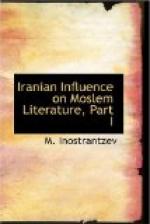Finally, the geographical notices permit us to determine in a more exact fashion the time of the origin of the letter.... The letter was consequently, composed after the march of Khusro I towards the East by the destruction of the Hephthahtes, but before the capture of Yemen. that is to say, between 557-570.
Christensen finally notes that Marquart has arrived at the same conclusion, by another way, namely, that the letter is a fiction of the time of Khusro I. (See Eranshahr page 30, note 2).
APPENDIX VII
Some Arabic authors and the Iranian material they preserve.
IRANIAN MATERIAL IN THE UYUNAL AKBHAR OF IBN QOTAIBA.
[Note,—Brockelmann’s edition of the Uyunal Akhbar is not accessible to me in India. I have carefully examined the first volume of the Cairo Edition and the following will show the wealth of Iranian material comprised in the book.—G.K.N.]
When the Kisra died this was reported to the Prophet who inquired who was going to succeed the dead emperor and when he was told his daughter, the princess Buran, the Prophet declared that the nation could not prosper inasmuch as its affairs depended upon a woman. (p. 11).
[Sidenote: Next-of-kin marriage.]
I have read in the Book of the Persians an epistle written by Ardeshir, son of Babak to his subjects declaring that the ecclesiastical authorities were the upholders of the religion and that the warriors were the bearers of the casque and literature, and were ornaments of the empire and that the agriculturists were pillars of the country. (p. 15). [In the course of the epistle there is a reference to marriage of next of kin, the king exhorting his subjects to tazauwa-ju-fil qarabayn.]
[Sidenote: Kitab Ain or the Pahlavi Ain-nameh.]
[Sidenote: Anushirwan’s rule.]
I have read in the Ain that a king of Persia said in his address to his people: “I am only the ruler of people’s bodies, not their minds; and I govern with justice, not according to my pleasure; and I safeguard people’s property, not their secrets.” Furthermore, the Persians say the most efficient of rulers is he who draws the bodies of his subjects to fealty to him through their hearts. When Anushirwan appointed a person to an office he directed his secretary to leave out in the appointment order a space of four lines so that he may fill it up with his own hand, and when the appointment order was brought to him he would write in it “govern the good people by love, and for the common people mix liberty with awe and govern the proletariat with levity.” (p. 15).
And it is said in the Book of the Persians that the hearts of the people are the treasuries of the king, so that whatever is put there should be made known to him. (p 17).
[Sidenote: The Taj.]




